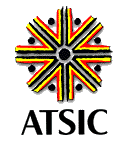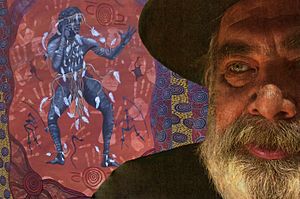Aboriginal and Torres Strait Islander Commission facts for kids
 |
|
| Agency overview | |
|---|---|
| Formed | 5 March 1990 |
| Preceding Agency |
|
| Dissolved | 30 June 2005 |
| Superseding agency | |
| Jurisdiction | Commonwealth of Australia |
| Headquarters | Canberra |
| Agency executives |
|
| Website | atsic.gov.au |

The Aboriginal and Torres Strait Islander Commission (ATSIC) was an important Australian Government group that worked from 1990 to 2005. Its main job was to help Aboriginal Australians and Torres Strait Islanders have a say in government decisions that affected their lives. It was set up by the Hawke government in 1990.
Many different programs and groups for Indigenous people were part of ATSIC. The agency was eventually closed down in 2005.
Contents
History of ATSIC
ATSIC was created by the Hawke government on 5 March 1990. It took over from an older group called the Aboriginal Development Commission (ADC). The idea was to bring together different services for Indigenous Australians under one main group.
When ATSIC started, it helped provide loans for small businesses and larger grants. Another group, the ATSIC Development Corporation (ATSICDC), focused on bigger business projects.
What ATSIC Did
ATSIC was made up of people who were elected by Indigenous communities. Their main goal was to look after the needs of Indigenous Australians, including the many Aboriginal peoples and Torres Strait Islander peoples.
In 1994, a separate group called the Torres Strait Regional Authority (TSRA) was created. This group focused on providing services to Torres Strait Islander people living in the Torres Strait Islands.
Important leaders of ATSIC included Lowitja O'Donoghue (1990-1996), Gatjil Djerrkura (1996-2000), and Geoff Clark (2000-2004).
Challenges and Changes
Over time, there were concerns about how ATSIC was managed. In 2001, some investigations looked into how funds meant for helping Aboriginal people were being used.
Because of these concerns, the government, led by Prime Minister John Howard, started to change how ATSIC worked. Some of ATSIC's money management powers were moved to a new group called Aboriginal and Torres Strait Islander Services (ATSIS).
In 2003, a review of ATSIC was ordered. This review looked at how well ATSIC was connecting with Indigenous Australians. The report suggested changes to give more control to Aboriginal and Torres Strait Islander people at a local level.
Why ATSIC Was Closed Down
After the review, the government had doubts about whether ATSIC should continue. In 2004, both the government and the main opposition party agreed that ATSIC was not working as well as it should.
Prime Minister Howard announced on 15 April 2004 that ATSIC would be closed. He said that the way Indigenous people were represented through ATSIC had not been successful. Legislation (new laws) to close ATSIC was introduced to the Federal Parliament. These laws were passed in 2005, and ATSIC officially closed on 24 March 2005.
What Came Next
After ATSIC closed, new ways were set up to manage Indigenous affairs in Australia.
Ministerial Taskforce on Indigenous Affairs
A group called the Ministerial Taskforce on Indigenous Affairs (MTF) was created in May 2004. Its job was to improve services and results for Indigenous Australians.
Office of Indigenous Policy Coordination
The Office of Indigenous Policy Coordination was set up in July 2004. It took over many of ATSIC's responsibilities. This office helped to plan and manage the government's new approach to Indigenous affairs.
National Indigenous Council
In November 2004, a new group called the National Indigenous Council was announced. This council was made up of experts chosen by the government. Its role was to give advice to the Australian Government on policies and services for Aboriginal people and Torres Strait Islanders.
See also
- Australian Aboriginal identity
- Indigenous Voice to Parliament
- List of Australian Commonwealth Government entities
- National Aboriginal and Torres Strait Islander Education Policy
 | Shirley Ann Jackson |
 | Garett Morgan |
 | J. Ernest Wilkins Jr. |
 | Elijah McCoy |

